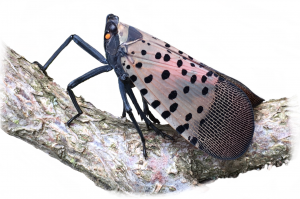
Help Slow the Spread in Virginia
Spotted Lanternfly (Lycorma delicatula) is an invasive insect first detected in our area in Frederick County, Virginia, in January 2018. Since that time our Extension Agent, Mark Sutphin, along with our Extension Master Gardeners and Virginia Cooperative Extension, have monitored for the insect, helped with I.D., and been an integral part of the effort to stop the spread of this destructive pest.
Impact
The spotted lanternfly lays eggs on items like plants, lumber, firewood, construction materials, equipment and vehicles. This insect can have a massive impact on crops and farms. The spotted lanternfly can devastate vineyards, impact forest products and be a nuisance in the home landscape. Trucks, shipping containers, agricultural haulers and other vehicles traveling in and out of the quarantine zone will need to be permitted, inspected and possibly treated or washed. Residents, business owners, farmers, Extension Master Gardeners, and leaders must do all we can to control the spread of this species.
Quarantine and Permits
The Virginia Department of Agriculture and Consumer Services (VDACS) announced on July 8, 2022, that Virginia’s Spotted Lanternfly Quarantine has expanded to include the counties of Albemarle, Augusta, Carroll, Page, Prince William, Rockbridge, Rockingham, Shenandoah, and Wythe and the cities of Buena Vista, Charlottesville, Harrisonburg, Lexington, Lynchburg, Manassas, Manassas Park, Staunton, and Waynesboro. This quarantine expansion is based on survey data indicating that spotted lanternfly (Lycorma delicatula) has become prevalent in these cities and counties. Frederick, Clarke and Warren counties and the city of Winchester, which were previously included in Virginia’s Spotted Lanternfly Quarantine, will remain so until further notice.
Businesses located in the quarantine area in Virginia that are shipping regulated articles outside of the quarantine area must obtain a spotted lanternfly permit. Among the regulated articles are construction materials, firewood, grills, outdoor furniture covers, lawn mowers, lumber, nursery stock, shipping containers, tarps, tile, and stone. To acquire a permit, business operators must complete an online training course before applying. There is a $6 training fee per person, but no fee for the permit, which is recognized by other states. Links to relevant training and permit documents are below.
- Spotted Lanternfly Permit Training (cost $6)
What You Can Do
- Late Summer and Fall
- Fall and Winter
- Look for egg masses and destroy.
 SLF lay eggs on trees and many other surfaces, such as: firewood, backyard grills, garden equipment and debris, patio furniture, waste bins, hunting stands and blinds, pallets, vehicles.
SLF lay eggs on trees and many other surfaces, such as: firewood, backyard grills, garden equipment and debris, patio furniture, waste bins, hunting stands and blinds, pallets, vehicles.- If egg masses are found, scrape them off the surface and destroy. A stick, credit card, screwdriver, putty or pocket knife, etc. can be used to scrape or smash egg mass. Eggs can be dropped into rubbing alcohol, hand sanitizer, or simply crushed.
- Fact Sheets and Videos with Control Measures and Best Management Practices
- Best Management Practices for Spotted Lanternfly in Yards and Landscapes
- Best Management Practices for Spotted Lanternfly on Christmas Tree Farm
- Spotted Lanternfly in Virginia Vineyards
- Spotted Lanternfly Banding 2020 Video from Pennsylvania State University
- Spotted Lanternfly Circle Trap Video from Pennsylvania State University
Información en Español
Informations en Français
Additional Resources- Virginia Cooperative Extension’s Spotted Lanternfly page.
- Virginia Department of Agriculture and Consumer Sciences
- City of Winchester’s Stop the Spotted Lanternfly page.
- Virginia Department of Forestry’s Control and Utilization of Tree-of-Heaven
- Virginia Tech’s Ailanthus and Lookalikes Tree Identification.
Virginia Cooperative Extension is a partnership of Virginia Tech, Virginia State University, the U.S. Department of Agriculture (USDA), and local governments, and is an equal opportunity employer. For the full non-discrimination statement, please visit ext.vt.edu/accessibility.


